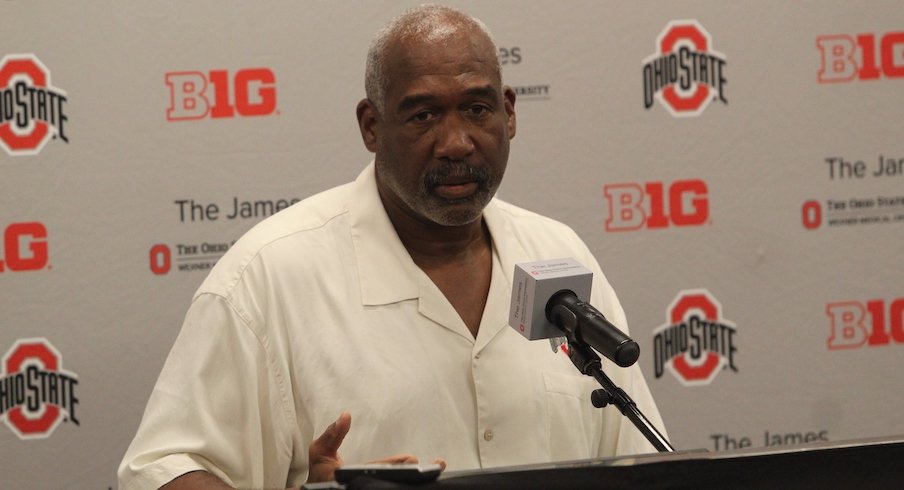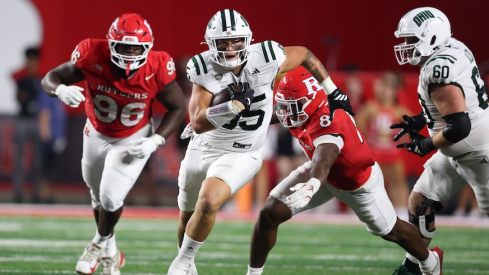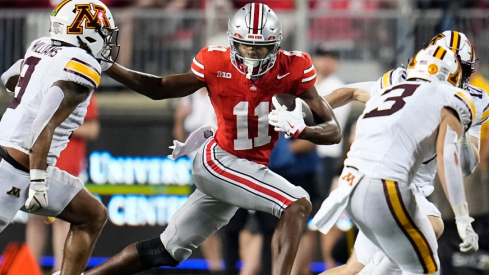In four weeks from Tuesday, on Oct. 29, a working group co-chaired by Ohio State athletic director Gene Smith will present a report to the NCAA’s Board of Governors with its recommendations for how the organization should proceed forward with updating its policies for whether student-athletes can profit from their name, image and likeness.
The pressure on the NCAA to take action from there just ratcheted up.
With California Gov. Gavin Newsom signing the Fair Pay to Play Act on Monday, collegiate athletes in the state of California are set to be allowed to receive outside benefits beginning in 2023.
The bill stipulates that schools in California cannot prevent student-athletes from earning compensation through use of their name, image, or likeness, and also that the NCAA and other collegiate athletic associations cannot prevent student-athletes from participating in sports for receiving said compensation.
While those rules would only apply to student-athletes at schools within the state of California, representatives in other states have followed California’s lead in proposing similar legislation of their own, including Florida, Minnesota, New York, Pennsylvania and South Carolina – and laws in some of those states, if passed, could potentially go into effect before 2023.
That means the clock is ticking for the NCAA to change its own policies or face the possibility of a new world in which student-athletes in some states would have the ability to profit from their name, image and likeness and hire agents who are licensed by their states, while student-athletes in other states still might not.
Smith believes it is time for the NCAA to consider making changes, which is why he’s a part of the working group that will advise the governing body on possible changes it could make. He is concerned, though, about the impact that the new state law in California – and potential laws in other states – could have if it goes into effect on its own.
“We can’t have a situation where we have schools and/or states with different rules for an organization that’s going to compete together,” Smith said during a press conference at Ohio State on Tuesday.
Smith did not directly address whether he believes student-athletes should be allowed to profit off their name, image and likeness, nor did he specify what changes he believes the NCAA should make; he won’t get into those specifics until after the working group makes its recommendations to the NCAA later this month.
He acknowledged, though, that the NCAA has been slow to modernize its policies, and that the law that has now been passed in California and laws that could soon be passed in other states will force the NCAA to speed up that process.
“Sometimes a complex, bureaucratic organization needs a pressure group to help it see itself,” Smith said. “So I’m not opposed to what they’re doing.”
Smith believes the California law specifically, though, lacks the regulation that is necessary to prevent schools from directly using those benefits to their advantage in recruiting.
“My concern with the California bill, which is all the way wide-open monetizing your name, image and likeness, is it moves slightly toward pay for play,” Smith said. “And it’s very difficult for us, for practitioners in the space, to figure out, how do you regulate that? How do you ensure that the unscrupulous bad actor does not enter that space, and ultimately create an unlevel playing field? And we know that there’s not a level playing field in a lot of different ways, but one of our principles is to try and create rules and regulations, to try and achieve fair play. So how do you do that, and ensure that the third-party bad actor doesn’t enter that space and ultimately, drive some environments to a point where recruiting becomes an even bigger advantage than it is for some other schools.”
While a nationwide open market for name, image and likeness benefits would likely play into Ohio State’s advantage from a recruiting standpoint, Smith believes it is important to take into consideration that new policies will not only apply to major college football programs and their student-athletes, but across student-athletes of all sports and at NCAA institutions of all sizes. The working group that he is co-chairing includes university presidents, athletic directors and student-athletes from Division I, II and III, in the interest of considering a diverse array of perspectives on the pros and cons of potential policy changes.
“The reality is it’s complex, it’s diverse and we need to be sensitive to all those schools across the country that are different than Ohio State or Alabama or Texas or Oklahoma,” Smith said.
Most imperatively, though, Smith believes it is crucial for everyone to be playing by a standardized set of rules. If the rules differ from state to state, some states will have unfair advantages over others – which is why Smith said he would not schedule games against schools from California, or other states that might pass laws, if laws go into effect there that allow them to play by a different set of rules than Ohio and the rest of the country.
“If that happens, what we need is federal help, to try and make sure that we create rules and regulations for all of our membership,” Smith said. “And if that doesn’t happen, then we’re looking at a whole new model. A whole new model. And that is reality.”
“We can’t have a situation where we have schools and/or states with different rules for an organization that’s going to compete together.” – Gene Smith
During his press conference, Smith referenced an appearance on Fox Business by former Ohio State wide receiver Anthony Gonzalez on Tuesday in which Gonzalez said he believes there should be federal legislation that allows college athletes to receive payment but is regulated at a national level.
“I actually think that what we should have is we should have one federal law that allows this to take place but alongside of regulation at the NCAA level,” said Gonzalez, who now represents the state of Ohio’s 16th congressional district in the U.S. House of Representatives. “That’ll even the playing field for everybody, and it’ll provide important benefits to athletes who I think absolutely deserve them. And so that’s ultimately the direction that I hope this goes, and I’ll be looking to introduce legislation along those lines.”
Smith isn’t the only one from Ohio State who will be involved in shaping how the NCAA ultimately decides to proceed forward with regulations on allowing student-athletes to receive external benefits. University president Michael Drake, who has expressed that he believes it is important for college athletics to remain distinct from professional athletics, is the chairman of the Board of Governors that will hear the working group’s report later this month.
“So we have the collegiate model of sport and the professional model of sport, and I think that my colleagues and I are devoted to keeping those appropriately distinct, and protecting those things which make college athletics so special to so many people,” Drake said in a September interview with Eleven Warriors. “At the same time, we are very concerned. In our day jobs, our work is to support students moving forward, so we want to be appropriate in supporting our students and our student-athletes. The NCAA has, as you know, over 400,000 student-athletes, and so we think about their success, their welfare all the time.”
Smith said he expects the working group and Board of Governors to work together to come up with a proposal for how the NCAA could update its policy on name, image and likeness benefits, but said that proposal likely will not be completed until the latter half of 2020.
As for Ohio State’s current football players and coaches, their focus right now is simply on trying to beat Michigan State and improve to 6-0 on Saturday. Ohio State head coach Ryan Day, said his views on whether college athletes should be able to receive benefits are “very much aligned” with Smith’s.
“I understand that it's very complex, and I think it's an exciting issue for student-athletes,” Day said. “But I'm interested to see kind of where it goes and the talks that happen. I do definitely think that there's opportunity out there for these guys, but at the same time, it's not that easy. There's a history of college football that has been around for a long time, and I know everybody is sensitive to not turn that off into a bad road.”
Ohio State quarterback Justin Fields acknowledged that he and his fellow players would like to have the opportunity to make money – and that some student-athletes might need that money more than he does personally – but said he hasn’t thought about it much personally because his focus is simply on trying to play his best for the Buckeyes.
“Of course the players want to get paid, but our focus is really not on getting paid,” Fields said. “Our focus is on winning games, so as long as we keep winning games, I think everyone will be happy around here.”


